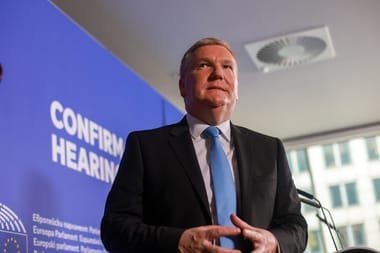Michael McGrath is prepared to give Hungary a chance to make things rights but stands ready to turn off the EU money taps.

BRUSSELS — Michael McGrath, the European Union’s new commissioner for democracy and rule of law, is a fresh EU face offering a fresh start for Brussels’ tense rule-of-law and funding row with Viktor Orbán’s Hungary.
But the former Irish finance minister insists he’s no pushover and won’t shy away from pulling the plug on EU funding for the country if necessary.
« It is never too late for anyone to pull back from the brink or to bring about positive change, » the Irish politician told POLITICO in an interview from his office on the eighth floor of the Berlaymont building.
The European Parliament triggered the first phase of the Article 7 procedure — also known as the « nuclear option » — against Hungary in 2018 over suspected « serious breaches » of the bloc’s core values and fundamental rights. The process, which could lead to the suspension of Hungary’s voting rights, has stalled because of political divisions among member countries.
In 2022, the EU executive wielded previously unused powers to rein in rule-breakers, allowing it to freeze certain funds to countries. It moved to block about €22 billion in EU cohesion cash earmarked to Hungary amid concerns over human rights and the independence of the judiciary.
It eventually unfroze more than €10 billion last year, sparking backlash from lawmakers, but Hungary now faces a Dec. 31 deadline if it doesn’t want to lose about €1 billion for good.
« The Commission has shown a willingness to act where appropriate and various steps have been taken … but I am a new commissioner, » McGrath stressed. He already had a « good meeting » with János Bóka, the Hungarian minister for European affairs.
« I will not be aggressive or bombastic in any way, but that should not be mistaken for weakness, » he added, brushing off criticism from the co-leader of the Greens in the Parliament Terry Reintke that he might be « too Irish » for the job.
It’s actually a « compliment, » he said.
The Irish government put forward the name of the quiet McGrath, a former finance minister, in June and stood by it, despite pressure from Brussels to consider a female alternative. Sometimes described as “inscrutable” and unwilling to play politics, McGrath’s new challenging role may force him to make political enemies.

« I’m an experienced politician … I know when to use diplomacy, but I’m also willing to be robust and to be as tough as I need to be » and « won’t hesitate » to use the tools at my disposal, he said.
Commission President Ursula von der Leyen has tasked the Irish official and Piotr Serafin, the new budget commissioner, with building stronger links between the yearly rule-of-law checks and the allocation of all EU funds.
The latest report from the Commission on Hungary still identified serious shortcomings in media freedom and pluralism, and anti-corruption.
The revision of the conditionalist mechanism will « be in the context of the next budgetary cycle, » McGrath said, but the « principle is clear. Compliance with the rule of law is a must for access to EU funds. »




